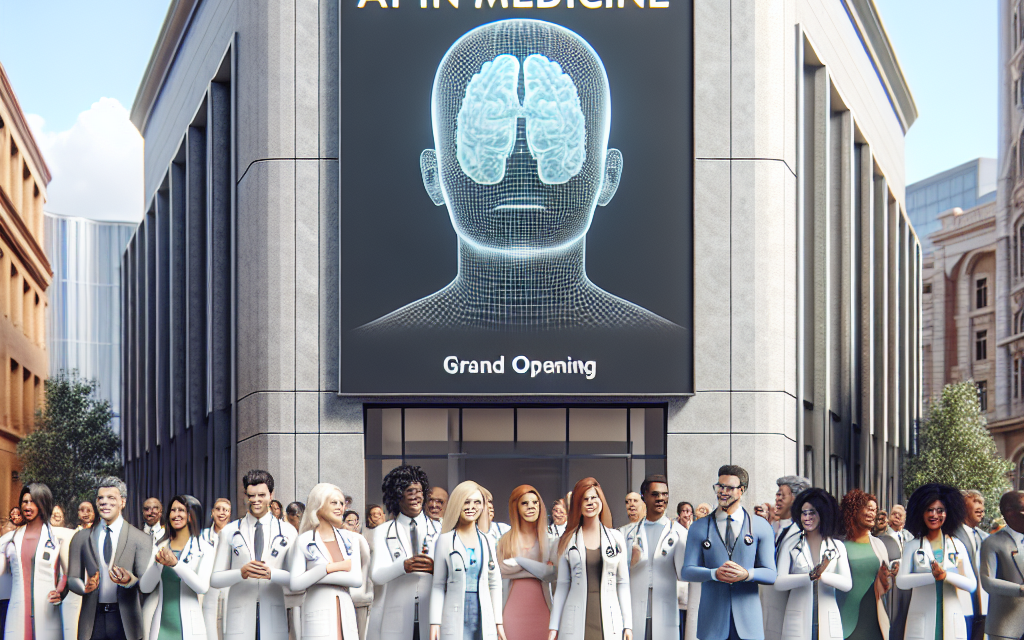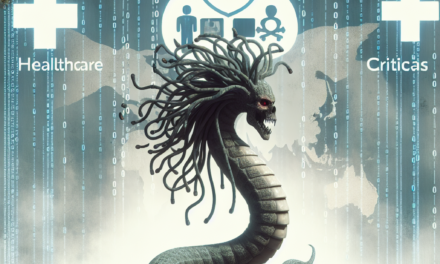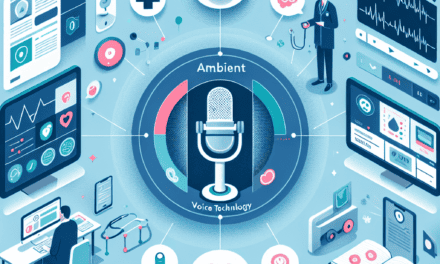SingHealth Launches Institute for AI in Medicine
In a groundbreaking move that underscores the growing intersection of technology and healthcare, SingHealth, one of Singapore’s largest healthcare groups, has launched the Institute for AI in Medicine (I-AIM). This initiative aims to harness the power of artificial intelligence (AI) to enhance patient care, streamline operations, and drive innovation in medical research. As healthcare systems worldwide grapple with increasing demands and complexities, the establishment of I-AIM represents a significant step towards integrating advanced technologies into clinical practice. This article delves into the various facets of this initiative, exploring its implications, potential applications, and the future of AI in medicine.
The Vision Behind I-AIM
The vision for the Institute for AI in Medicine is rooted in the need to improve healthcare delivery through innovative solutions. SingHealth recognizes that the healthcare landscape is rapidly evolving, with an increasing volume of data generated from patient interactions, medical devices, and research. The challenge lies in effectively utilizing this data to enhance patient outcomes and operational efficiency.
Key objectives of I-AIM include:
- Developing AI-driven tools that assist healthcare professionals in diagnosis and treatment.
- Enhancing patient engagement through personalized medicine.
- Streamlining administrative processes to reduce the burden on healthcare staff.
- Fostering collaboration between clinicians, researchers, and technology experts.
- Conducting research to advance the understanding of AI applications in medicine.
By focusing on these objectives, I-AIM aims to position SingHealth at the forefront of medical innovation, ultimately leading to improved patient care and outcomes. The institute is expected to serve as a hub for collaboration, bringing together experts from various fields to explore the potential of AI in healthcare.
AI Applications in Clinical Practice
One of the most promising aspects of the Institute for AI in Medicine is its potential to revolutionize clinical practice. AI technologies can assist healthcare professionals in various ways, from diagnostics to treatment planning. Here are some key applications:
1. Diagnostic Support
AI algorithms can analyze medical images, lab results, and patient histories to assist in diagnosing conditions more accurately and quickly. For instance, deep learning models have shown remarkable success in identifying diseases such as cancer from radiological images. A study published in the journal Nature demonstrated that an AI system could outperform human radiologists in detecting breast cancer in mammograms.
2. Predictive Analytics
AI can analyze vast amounts of patient data to identify trends and predict outcomes. For example, predictive models can forecast which patients are at risk of developing certain conditions, allowing for early intervention. This proactive approach can significantly improve patient outcomes and reduce healthcare costs.
3. Personalized Treatment Plans
AI can help tailor treatment plans to individual patients by analyzing genetic information, lifestyle factors, and treatment responses. This personalized approach can enhance the effectiveness of treatments and minimize adverse effects. For instance, AI-driven platforms are being developed to recommend personalized cancer therapies based on a patient’s genetic profile.
4. Virtual Health Assistants
AI-powered chatbots and virtual assistants can provide patients with immediate access to information and support. These tools can answer common health queries, schedule appointments, and even monitor patients’ conditions remotely. This not only improves patient engagement but also alleviates the workload on healthcare professionals.
5. Drug Discovery and Development
The drug discovery process is notoriously lengthy and expensive. AI can streamline this process by analyzing biological data to identify potential drug candidates more efficiently. For example, companies like Atomwise are using AI to predict how different compounds will interact with specific diseases, significantly reducing the time required for drug development.
These applications illustrate the transformative potential of AI in clinical practice. By integrating AI technologies into everyday healthcare operations, I-AIM aims to enhance the quality of care provided to patients while also improving the efficiency of healthcare systems.
Research and Development Initiatives
The establishment of I-AIM is not just about applying existing AI technologies; it also emphasizes the importance of research and development (R&D) in advancing the field of AI in medicine. The institute is committed to fostering a culture of innovation through various R&D initiatives.
1. Collaborative Research Projects
I-AIM plans to initiate collaborative research projects that bring together clinicians, data scientists, and AI researchers. These projects will focus on identifying specific healthcare challenges that can be addressed through AI solutions. By leveraging the expertise of diverse teams, I-AIM aims to develop cutting-edge technologies that can be implemented in clinical settings.
2. Clinical Trials and Validation
Before AI tools can be widely adopted in healthcare, they must undergo rigorous testing and validation. I-AIM will conduct clinical trials to assess the effectiveness and safety of AI applications. This process is crucial for gaining the trust of healthcare professionals and patients alike. For instance, AI algorithms used for diagnostic purposes will need to demonstrate their accuracy and reliability in real-world clinical environments.
3. Education and Training Programs
To ensure that healthcare professionals are equipped to work alongside AI technologies, I-AIM will develop education and training programs. These programs will focus on enhancing the digital literacy of clinicians and providing them with the skills needed to interpret AI-generated insights. By fostering a workforce that is comfortable with AI, I-AIM aims to facilitate the seamless integration of these technologies into clinical practice.
4. Ethical Considerations and Guidelines
The use of AI in medicine raises important ethical questions, particularly regarding data privacy, bias, and accountability. I-AIM is committed to addressing these concerns by developing ethical guidelines for the use of AI in healthcare. This includes ensuring that AI systems are transparent, fair, and accountable, thereby building trust among patients and healthcare providers.
5. Continuous Innovation
The field of AI is constantly evolving, and I-AIM recognizes the need for continuous innovation. The institute will stay abreast of the latest advancements in AI technology and explore how these can be applied to healthcare. This commitment to innovation will ensure that SingHealth remains a leader in the integration of AI in medicine.
Through these R&D initiatives, I-AIM aims to create a robust ecosystem that fosters innovation and drives the development of AI solutions tailored to the unique challenges of healthcare.
Impact on Healthcare Workforce
The integration of AI into healthcare is expected to have a profound impact on the workforce. While there are concerns about job displacement, the reality is that AI will likely augment the capabilities of healthcare professionals rather than replace them. Here are some key considerations regarding the impact of AI on the healthcare workforce:
1. Enhanced Decision-Making
AI tools can provide healthcare professionals with valuable insights that enhance their decision-making capabilities. By analyzing patient data and generating evidence-based recommendations, AI can support clinicians in making more informed choices. This collaborative approach can lead to better patient outcomes and increased job satisfaction among healthcare providers.
2. Reducing Administrative Burden
Healthcare professionals often face significant administrative burdens that detract from their ability to provide patient care. AI can automate routine tasks such as scheduling, billing, and documentation, allowing clinicians to focus more on patient interactions. This shift can lead to improved job satisfaction and reduced burnout among healthcare workers.
3. New Roles and Skillsets
The rise of AI in healthcare will create new roles that require specialized skills. For instance, data analysts and AI specialists will be needed to develop and maintain AI systems. Additionally, healthcare professionals will need to acquire skills in interpreting AI-generated insights and integrating them into clinical practice. This evolution of roles presents opportunities for professional development and career advancement.
4. Interdisciplinary Collaboration
The integration of AI in medicine will necessitate greater collaboration between healthcare professionals and technology experts. Clinicians will need to work closely with data scientists and AI developers to ensure that AI tools are designed with clinical needs in mind. This interdisciplinary collaboration can lead to innovative solutions that address real-world healthcare challenges.
5. Continuous Learning and Adaptation
As AI technologies continue to evolve, healthcare professionals will need to engage in continuous learning to stay current with advancements. This commitment to lifelong learning will be essential for adapting to new tools and methodologies. Organizations like I-AIM can play a crucial role in providing ongoing education and training opportunities for the healthcare workforce.
Overall, the impact of AI on the healthcare workforce is expected to be transformative, leading to enhanced decision-making, reduced administrative burdens, and new opportunities for professional growth.
Challenges and Considerations
While the potential benefits of AI in medicine are significant, there are also challenges and considerations that must be addressed. The successful implementation of AI technologies in healthcare requires careful planning and consideration of various factors.
1. Data Privacy and Security
The use of AI in healthcare involves the collection and analysis of vast amounts of patient data. Ensuring the privacy and security of this data is paramount. Healthcare organizations must implement robust data protection measures to safeguard patient information from breaches and unauthorized access. Compliance with regulations such as the General Data Protection Regulation (GDPR) is essential to maintain patient trust.
2. Addressing Bias in AI Algorithms
AI algorithms are only as good as the data they are trained on. If the training data is biased or unrepresentative, the resulting AI models may perpetuate existing disparities in healthcare. It is crucial to ensure that AI systems are developed using diverse and representative datasets to minimize bias and ensure equitable outcomes for all patients.
3. Integration with Existing Systems
Integrating AI technologies into existing healthcare systems can be complex. Healthcare organizations must ensure that AI tools are compatible with electronic health records (EHRs) and other clinical systems. This requires collaboration between IT teams, clinicians, and AI developers to create seamless workflows that enhance rather than disrupt clinical practice.
4. Regulatory and Legal Considerations
The regulatory landscape for AI in healthcare is still evolving. Policymakers must establish clear guidelines for the use of AI technologies, including standards for safety, efficacy, and accountability. Healthcare organizations must navigate these regulations to ensure compliance while also fostering innovation.
5. Change Management and Cultural Shift
The successful adoption of AI in healthcare requires a cultural shift within organizations. Healthcare professionals must be open to embracing new technologies and adapting their workflows accordingly. Change management strategies, including education and training, will be essential for facilitating this transition and ensuring that staff feel supported throughout the process.
Addressing these challenges will be critical for the successful implementation of AI in medicine. By proactively tackling these issues, I-AIM can help pave the way for a future where AI technologies enhance patient care and improve healthcare outcomes.
Conclusion
The launch of the Institute for AI in Medicine by SingHealth marks a significant milestone in the integration of artificial intelligence into healthcare. With its focus on research, collaboration, and innovation, I-AIM aims to harness the power of AI to enhance patient care, streamline operations, and drive advancements in medical research.
As we have explored, the potential applications of AI in clinical practice are vast, ranging from diagnostic support to personalized treatment plans. The institute’s commitment to research and development will foster a culture of innovation, ensuring that SingHealth remains at the forefront of medical technology.
While the integration of AI presents challenges, such as data privacy concerns and the need for interdisciplinary collaboration, the benefits are undeniable. By enhancing decision-making, reducing administrative burdens, and creating new roles within the healthcare workforce, AI has the potential to transform the way care is delivered.
As we look to the future, it is clear that the successful implementation of AI in medicine will require a concerted effort from all stakeholders, including healthcare professionals, researchers, policymakers, and technology experts. With initiatives like I-AIM leading the way, we can anticipate a future where AI plays a pivotal role in improving healthcare outcomes for patients around the world.





